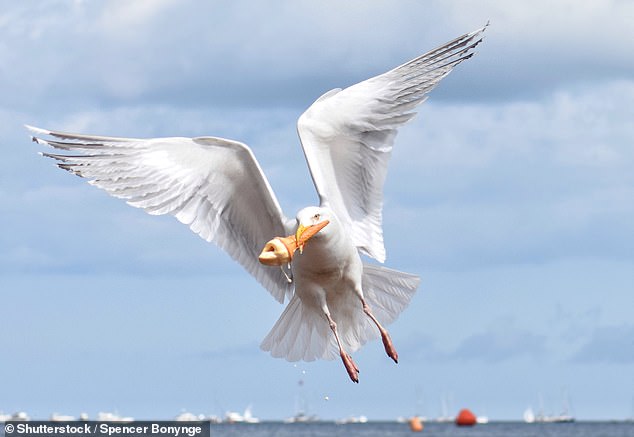Your ice cream is safe for now! Seagulls living in busy cities prefer seafood, study finds

Anyone with common sense knows that it’s a good idea to protect your food when you’re at the seaside.
But while seagulls may steal your chips – or even your ice cream – they actually prefer seafood, a study has found.
Researchers have found that seagull chicks raised on an ‘urban’ diet still prefer fish over human snacks.
The team from the University of Exeter studied herring gull chicks that had been rescued after falling from roofs in towns in Cornwall.
During their captivity, before being released, they were fed either a ‘sea diet’ consisting mainly of fish and mussels, or an ‘urban’ diet consisting mainly of bread and cat food.

Anyone with common sense knows that it’s a good idea to protect your food when you’re at the seaside. But while seagulls may steal your chips – or even your ice cream – they still prefer seafood, according to a study
Every few days the gull chicks were given a choice of all four types of food in different bowls, to test which they liked best. All gulls had a strong preference for fish.
“Our results suggest that even when raised on an ‘urban’ diet found only near people, these chicks are unlikely to forage for urban foods as adults,” said lead researcher Emma Inzani.
‘Human food is often both reliably available and easy to obtain, but when fish is available they clearly prefer it.’
Herring gulls are often seen as a pest in urban areas, where they scavenge for fallen food and eat in garbage bins. Sometimes they also take food from people.
However, the species is on the UK’s list of most concern conservation targets due to continued population declines.
Ms Inzani said a combination of declining fish stocks in UK waters – coupled with abundant and easy access to food waste in cities – could mean it is less profitable for gulls to spend significant energy searching for food at sea.

Researchers have found that seagull chicks raised on an ‘urban’ diet still prefer fish over human snacks
Previous research has shown that gull parents often switch to foraging for more seafood once their young have hatched, possibly because seafood provides the young with more nutrients they need to grow.
In the study, published in the journal PeerJ, all 27 chicks had access to food all day.
However, half of the chicks were fed urban food 80 percent of the day and seafood 20 percent of the day, while the other half of the chicks were fed the opposite diet.
When the subjects were presented with all four foods at once on days five, ten, fifteen, and thirty-five of the study, both groups consistently preferred the fish. Even those who tried the bread rarely ate much of it.
The chicks’ preference for fish found in this study may reinforce the behavior of parent birds, which switches to more marine foods after the chicks hatch, the researchers said.
“Animals can live in urban areas and cause human food waste,” said lead researcher Dr. Neeltje Boogert.
‘But that doesn’t necessarily mean they’re doing well or that they like this food or that they’re trying to make the best of a bad situation.
‘More research is needed to understand how the food young animals are fed affects their later lives, including their food choice, health and reproduction.’




